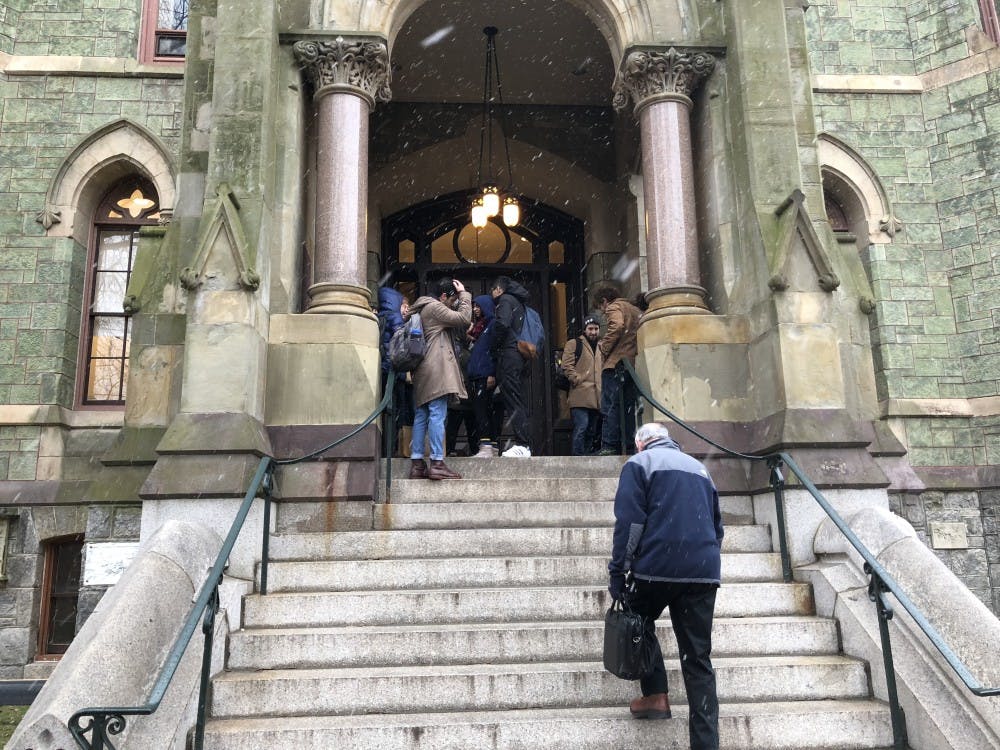A group of 17 students gathered on the snowy front steps of College Hall this morning to campaign for Penn to contribute to the improvement of Philadelphia's public schools.
As faculty and staff made their way into the building, students from Penn's chapter for the Student Labor Action Project stood outside College Hall, preparing a public letter drop calling for Penn to join a Payments In Lieu Of Taxes (PILOTs) agreement with Philadelphia in order to improve the city's public schools.
SLAP member and College senior Zoe Weissberg delivered a speech urging Penn to join the PILOTs agreement, which non-profit organizations do by making payments to the local governments to compensate for the lack of property tax revenue they contribute. Following her speech, Weissberg entered President Amy Gutmann’s office to deliver a letter of demands addressed to her and Board of Trustees Chairman David Cohen.

Penn is exempt from paying property taxes under the tax code even though it is the largest private landowner in Philadelphia. Various other private universities, including Harvard, Yale, Princeton, Dartmouth, Cornell, and Brown Universities are also exempt from these taxes, but make payments to their local government through PILOTs agreements.
Penn and Columbia are the only Ivy League institutions that do not voluntarily make these payments.
This is not the first time that students at Penn have attempted to lobby the University towards making a greater contribution to the Philadelphia school system. In 2015, dozens of students marched through campus, protested outside College Hall, and distributed petitions calling on the University to pay $6.6 million in aid to Philadelphia public schools.
Weissberg, who was involved in those efforts during her freshman year at Penn, said that although the campaign attracted national attention, it was ultimately unsuccessful — a fact she attributed to Penn’s lobbying power.
RELATED:
Though buzz has died down, SLAP continues its fight for Penn to pay PILOTs
More recently, on Tuesday, the organization presented two updated demands to the University: one, for Gutmann and Cohen to meet with SLAP in the next month, and two for the University to allow the city to conduct an unobstructed survey of all the land that Penn owns.
SLAP members, including College sophomore Brennan Burns, highlighted the juxtaposition between Penn’s wealth and the plight of Philadelphia Public Schools.
“The school system has dealt with really terrible chronic underfunding,” Burns said. “There’s been so little money that the school system has been forced to reduce the quality of its service to an absurd degree, particularly when you compare it to Penn.”

Students at a City Council vote on PILOTs in 2015. (File Photo)
It has been widely reported that Philadelphia's public schools have been underfunded for years. In 2013, Philadelphia officials voted to shut down 23 public schools, or about 10 percent of the city’s total, because of a budget deficit. In 2015, the school system faced the threat of shutdown again following a budget impasse on the state level.
"These financial difficulties have disproportionately affected minority students in the city," Burns said.
Penn has previously defended its refusal to pay PILOTS by citing the economic benefits it gives the city, such as adding jobs to the local economy and contributing $2 million annually to the University City District — a nonprofit that provides the neighborhood services like street cleaning and trash removal.
Additionally, Associate Vice President of University Communications Phyllis Holtzman wrote to The Daily Pennsylvanian in 2014 that "institutions that pay PILOTS are mostly in cities or municipalities that have a much greater reliance on property taxes and no comparable city wage tax like in Philadelphia," in reference to the fact that the University’s employees pay over $140 million to the city’s general fund from their paychecks.
Nonetheless, Penn's chapter of SLAP stands firm in its belief that Penn is not doing enough.
“Penn stands as a shameful exception among the Ivies,” Weissberg said. “This is a practice that is inexcusable in Philadelphia, which still is the poorest big city in the nation."



